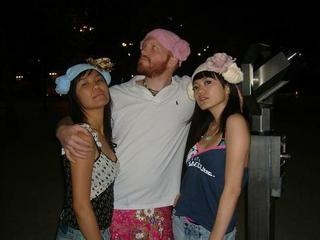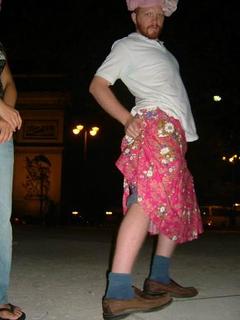 “Robo’s such a nice guy, but why does he hate America so much?”
“Robo’s such a nice guy, but why does he hate America so much?” I have to admit, first, that this question makes me grin every time I think about it. Not because it’s true—I’m not reveling in the satisfaction that people are finally catching on to some anti-American stink I carry—rather I grin because it’s funny in the same sense that it was funny that I spent the night of my college graduation walking seven miles on a dark, rainy highway in flip-flops—which is to say that it’s comically unfunny, like any Ben Stiller movie.
The question was posed by a friend of mine to one of my best friends during a fleeting conversation about my departure for Paris that had been several days before. I don’t remember the response that was given to the questioner, but I wish it had been something along the lines of
Why—for the same reason he sleeps in pig-skin pyjamas or the same reason he climbs flagpoles during thunderstorms—the obvious response, I hope, being He doesn’t.
My—and Will’s for that matter—perceived hatred or distaste of America has been a joking matter for quite some time now, especially since I voted for Kerry. My sister jokingly calls me a communist or a socialist—depending on the subject—and I’m never invited to barbeques anymore for fear that all the guests would lose their appetite when I throw the flag on the coals and start yelling, “That cloth is soaking with more than 200 years of blood!”
Okay, so that’s all fine and good. I don’t mind the jokes, assuming they are as such. The fact is that this friend of mine saw my desire to live other places, learn about other cultures, and all that other find-myself, coming-of-age crud that no one ever truly believes when you tell them; and she extrapolated some sort of America hatred. She’s not the first person to say something like that. I’ve had good friends—friends who joke all the time about it—ask me, “Okay, but, Robo, in all seriousness—” Which means, All this time I’ve been joking, I’ve been trying to conceal the awkward fact that I love my country and its people but you don’t. That’s when they say, “Robo, why do you hate us? That’s what the terrorists want.” (That’s not really a direct quote.)
My gosh, I think, I had steak and freedom fries for dinner just last night, and, damn, I love freedom kissing!
But, none of that matters once you’ve voted for a long-faced, hippy, pro-terrorist, bilingual (French-speaking for that matter), elitist, Democrat. Not to mention, you’ve done a fair amount of traveling to some of these countries, and you have friends from even more of them. You can’t be expected to form a well-founded, truly-American ideology when you’ve been tainted by so much outside mumbo-jumbo.
Before I left for college five years ago, I was always proud that at least for a fair amount of people I was the “nice guy” who was there and was to be trusted. People I didn’t even know would tell me they appreciated the way I treated them and made them comfortable. Now, after four years of college, living in two countries, traveling to fourteen others, staying with families from Italy to Sweden to Ireland, learning a second language, starting a third and a fourth, making friends from Nigeria to Brazil to Japan, one Taiwanese girlfriend, two world trade center towers, and three universities, I come home and told people, when asked, that there might be more than what we see here and that it might be more important for our lives here for us to go there and see. I say, “We’re really not that different from ‘them.’” I say that I have friends from South Korea that are scared sometimes, and that they’re not just people on the news. Then people, look back at me and say, “Man, you’ve changed.”
I’m not picketing or screaming or blaming.
I’m not even raising my voice.
I’m smiling, and I’m just saying.
Well, the jury’s in, Robo is now a tree-hugging, internationalist, and he wants to give the terrorists therapy rather than “smoke them out.” He doesn’t want to watch “freedom on march” over the Hindu Kush and through the streets of Fallujah, build democracies in pretty straight lines over the rubble of tyranny, or any number of the present analogies and anthropomorphized agendas that are presently being tossed around. If so, then, let’s take a look.

Robo the Liberal
 When I was eighteen, I voted for the first time in the 2000 election for none other than George W. Bush. As a kid, my father—who is largely responsible for the way I look at the world—always told me that Ronald Reagan was the best president we ever had, and I always had an affinity for him seeing as he was president when I was born—I remember distinctly how bizarre I felt seeing George H. W. Bush sitting in the oval office when I was six years old (I had had no idea—that I can remember—that he had been Vice-President).
When I was eighteen, I voted for the first time in the 2000 election for none other than George W. Bush. As a kid, my father—who is largely responsible for the way I look at the world—always told me that Ronald Reagan was the best president we ever had, and I always had an affinity for him seeing as he was president when I was born—I remember distinctly how bizarre I felt seeing George H. W. Bush sitting in the oval office when I was six years old (I had had no idea—that I can remember—that he had been Vice-President).

I was basically a poster child for a homegrown, conservative Republican. Throughout my schooling, all private and religious—Episcopal, Baptist, and Catholic—and growing up in the Presbyterian Church, I was instilled with good Republican values: pro-life (thusly, anti-death), the right to worship freely, etc. Coming from a large, very tight-knit family, I was certainly pro-family values. As for guns, I wanted them because I was a hunter and didn’t have a bow and arrow. Last but not least, I had never had to actually “pick myself up by my bootstraps”—not meaning I was spoiled, but that I was always cared for—so I was pro-“pick yourself up by your bootstraps.”
It’s thanks to this background that, though I’m a liberal, I still don’t think conservatives/Republicans are bad people. I know that’s not a rule, but it’s getting to be that if you (a) believe one thing then you are (b) totally against it’s opposite (or if you are (a) against one thing then you are (b) for its opposition). For instance, a sample conversation:
The “War on Terror” (a.k.a. “a global struggle against the enemies of freedom”):
“I think pre-emptive strikes are dangerous to our future,” I say.
“So you think we should just sit around and wait for another attack?” is the response I’m often met with.
“Um. No.”
Abortion:
“I think that making abortion illegal won’t help anything.”
“So you think it’s fine that women just go to the doctor and kill their babies.”
“Gosh, you read my mind.”
These are just a couple examples of the opposite-game that people play. I’m not saying that to patronize, because I’m sure I’ve done the same thing myself, and God knows I’ve caught a lot of crap from self-avowed liberals—keep in mind, I’ve been told I’m a liberal—that I’m an apologist or a fake, because I don’t think the opposite side is a band of greedy, racist, patriots lighting their torches for a witch hunt.
Now that I’m a liberal and I’ve change, let’s take a closer look:
| Robo…. | When he was a kind, young, conservative gentleman. | After he changed into an angry, whiny liberal |
| Pro-life (anti-death) | ☺ | ☻ |
| Family Values | ☺ | ☻ |
| Right to worship freely | ☺ | ☻ |
To preface my explanation to how this can be possible, I want to tell a little story. As a part of my Anti-Americanism class—no joke, that’s a real class, it was to look at the causes for anti-Americanism, not a how-to class—we had a panel discussion in which three liberals and three conservatives fielded questions from the class of about a hundred, and I was one of the chosen “liberals.” We debated things like same-sex marriages, foreign policy, etc. Every time one of us from one side got up and gave the other side a piece of our mind, someone from the other side would get up and say, “Actually, we agree.” The frequency with which this happened astounded me, because most of the people in the conservative group were—to be somewhat imprecise with my terminology—very conservative, and we had some rabid ones on our side as well—myself being the calm-headed voice of reason, of course.
I say this because one of the biggest things to get lost in all of this bickering in politics right now, is the fact that we all want the same thing—those of us who try to be as honest and just as possible. We care about ourselves, our families, and our fellow man. The difference is in our strategies on how to best achieve that.
The difference in your everyday liberal and everyday conservative is not that one baths in oil and that other doesn’t bath at all, it that the two see a different path to the same end.
That said, I’ll start with abortion. I’m still staunchly opposed to abortion, and I would love to see it put to an end. So, Robo, you may ask, how can you be anti-death and pro-choice at the same time? Good question. Well, simply, I don’t believe that making abortion illegal will in any way stop abortion. Say it were to be made illegal, the biggest difference would be the amount of babies left in dumpsters and ally-ways across the country. Legislation making abortions illegal would end abortions in the same way that making drugs illegal has so effectively ended the drug problem. Something that people often forget is that nobody actually wants to have an abortion, just like no one wants to be a junkie. That doesn’t mean that it’s going to stop, because people make mistakes, to put it very mildly.

Moving along quickly, you can thusly extrapolate my response to freedom of worship (that means freedom of all to worship, not just Christians….okay so I’ll just tell you why, no extrapolation needed) and family values (they’re for families not for the FCC). I mean, isn’t trying to get the government to butt out of our lives a conservative Republican thing?
Now, back to being in a foreign country and hating America. When people over here ask me about America, I laugh at them—not condescendingly, just out of the shear immensity of the question juxtaposed by the nonchalant manner in which it was asked—then I tell them there are two US’s (I can’t say two Americas, because there really are two—North and South….oh, well, I guess there’s Central also). There is the US that I grew up in, where I watched baseball games, where my family and friends are, where the first two decades of my life were spent. Then, there’s the other America that you watch on the news at night. It’s the one with racial problems, it’s the one at war, and it’s the one that was attacked on 9-11. There’s a huge difference between the two, and when I speak critically of America, it’s the second one I’m talking about. Just like when I criticize France, it’s the one that can’t handle racism and a corrupt history in foreign countries that I’m criticizing, not the one that feeds me well and goes out of its way to make me feel welcome.
That’s the most important thing to remember. If people remembered that, there never would be a 9-11, I’m convinced.

Finally, on a much larger scale and more importantly than all, I find patriotism to be one of the most repugnant traits in any country—to be clear that I’m not talking about just American patriotism. When I see all of the cars passing with American flags stickers and stickers that say “Let’s Roll,” I feel nothing but frustration. This isn’t because I want to keep people from loving where they are from. I myself love every aspect of the Lowcountry and of Charleston—the smell of pluff mud, the salt air, the heat, the beach, everything. That’s because it is what I know, and it is where my memories are. It is not because I think it’s better than someone else’s home. Furthermore, I know I am lucky to have been born in America, where there is so much opportunity.

That isn’t patriotism, that’s natural. When people take pride in history—the decades and centuries before their birth—and in the power of their country, that is what I can’t support. History is something to learn from and something to aspire to make, it is not something to take as one’s own or for his country. The power of a country is only as prolonged as the spirit of its people and their willingness to do their part.
A country is not a flag, or a status symbol. There was a comedian in the 90s named Bill Hicks who joked when talking about flag burning (paraphrase):
I hate those people that come up to me after I joke about flag burning.
“I don’t like what you said about the flag,” they say. “My father died for that flag.”
“That’s funny,” I say, “I bought mine.”
“My father died in Korea so that you have the right to burn that flag.”
“Wow! My flag says ‘Made in Korea’!”
My grandfather was a lieutenant colonel in WWII. He sacrificed more than a year of his life fighting against something that was evil. My grandmother gave birth to their first daughter while he was away. He came home a decorated veteran—silver star, bronze star, and purple heart. My grandfather didn’t do all of that for a flag.

Does Robo hate America? No. My life is there. True, I hate a lot of things that the government does—in full knowledge of the good things my country has done—but that doesn’t make me hate the people that go to and fro, the everyday people. I don’t hate anyone. Thus, when I leave, I don’t do it to escape, but to do my part. I have the interests I have for a reason, and I intend to do what I can to help people—Americans, Chinese, Angolan, or whoever else may come along.
I guess that’s the best way to explain it, when I hear “God Bless America” I can’t help but feel like a kind of middle finger to everyone else in the world. This trait is what leads others to construe me as anti-American—because I’m not so pro-American as I am pro-everyone. When all it is is that I see no reason to view Americans as different from anyone else—no better, no worse. Why not “God bless everyone”? Sure, it sounds corny and naïve, and I know there’s a lot of people that think I’m naïve to think that. Oh well.
I believe in people.




















